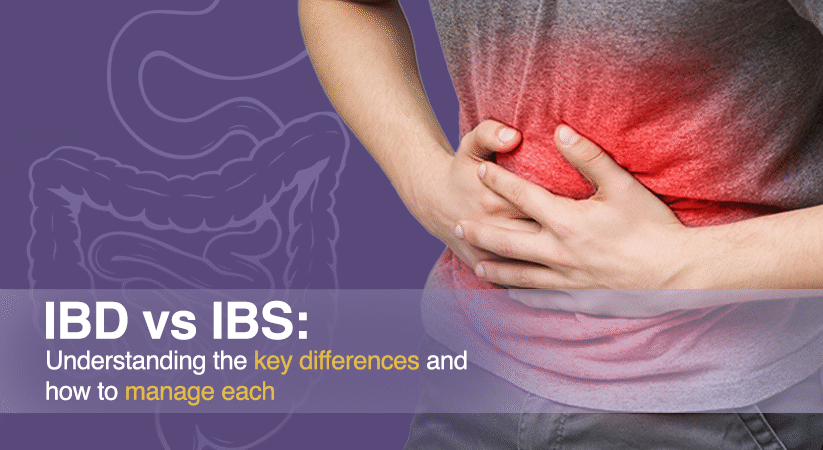Introduction to IBS and IBD
IBS (Irritable Bowel Syndrome) is a gut-brain axis functional disorder. It impacts the functioning of the digestive system but doesn’t result in structural harm or inflammation. The symptoms are varied and usually accompany stress or eating.
IBD (Inflammatory Bowel Disease) is a long-term inflammatory autoimmune disease, typically Crohn’s disease or ulcerative colitis. It entails true inflammation and damage to the lining of the gut and may extend to the whole gastrointestinal tract.
IBS is all about malfunction (no destruction of tissue), while IBD is characterised by chronic inflammation and architectural changes. IBD can have systemic implications; IBS usually doesn’t. Let’s understand the differences in detail.
Symptoms Comparison
IBS symptoms are cramping, bloating, and alternating diarrhoea and/or constipation. Pain in the abdomen usually relieves after a bowel movement.
Symptoms of IBD may be:
- Frequent diarrhoea, commonly long-standing
- Bloody stool or rectal bleeding
- Weight loss and tiredness
- Extra-intestinal complications: joint pain, skin problems, eye inflammation
- IBD is a chronic condition that can present with acute flare-ups, with risks such as anaemia, fever, and considerable weight loss.
Causes and Risk Factors
- IBS aetiology: It may be due to a hypersensitive gut-brain axis, changed gut motility, and microbiome alterations. Its underlying cause is still not well defined.
- IBD aetiology: IBD is considered an immune-mediated condition involving genetic susceptibility, dysregulated immune responses, and environmental triggers such as infections, diet, or microbiome changes.
- Common provoking factors: Stress and some foods can exacerbate symptoms. IBS is primarily functional, whereas IBD arises from inflammation and immune dysregulation.
Diagnosis Process
IBS is typically diagnosed based on symptom criteria and the exclusion of other diseases, as no structural defect is typically anticipated.
Tests employed can include:
- Detailed patient history
- Physical exam
- Routine blood and stool tests (to exclude infection or inflammation)
- Occasionally, a colonoscopy is recommended if alarm features are present
IBD needs concrete evidence of inflammation and damage through:
- Blood markers (CRP, ESR)
- Stool calprotectin
- Colonoscopy with biopsies
- Imaging (MRI, CT) or capsule endoscopy for upper GI involvement
Conclusion
IBS and IBD are two very different conditions, but they can deeply affect daily life. IBS is a functional disorder optimally treated with diet, stress management, and symptom relief. On the other hand, IBD is a severe inflammatory disease that needs anti-inflammatory treatments and occasionally surgery. Understanding their causes, symptoms, and treatments helps you devise a healthcare plan that works for you. Early diagnosis and personalised care can make a significant difference in your quality of life.
Gastroenterologists at Chirag Global Hospitals, in collaboration with Ayurvedic doctors from the Chiraayu wing, offer comprehensive and personalised care for patients with IBD and IBS. This integrative approach combines evidence-based modern medicine with Ayurvedic therapies, including Panchakarma, to detoxify the body, enhance metabolism, and address the root causes of disease while providing symptom relief and dietary guidance tailored to individual needs
Continue reading here to know more about: IBD vs IBS





Comments